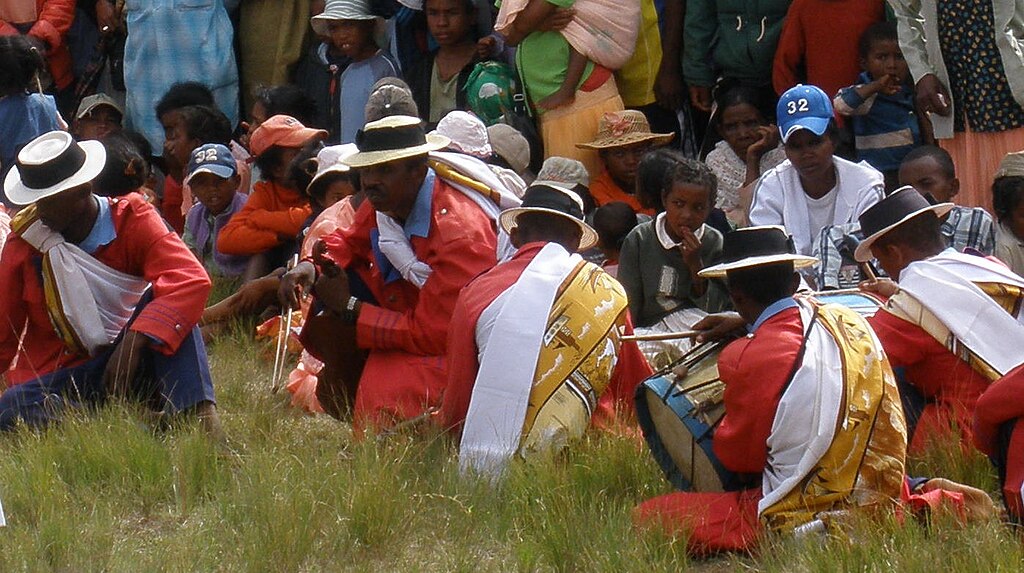Celebrating Fihavanana: The Roots of Giving Traditions and Practices in Madagascar

Credit: Lemurbaby via Wikimedia Commons
12 May 2008
| Giver: | Community, Individual |
|---|---|
| Receiver: | Individual or unstructured/informal group |
| Gift: | Money, Other, Time |
| Approach: | Reciprocal Gift |
| Issues: | 1. No Poverty, 10. Reduced Inequalities, 11. Sustainable Cities and Communities, 12. Responsible Consumption and Production, 16. Peace, Justice and Strong Institutions, 2. Zero Hunger, 3. Good Health and Well-Being, 5. Gender Equality |
| Included in: | African Philanthropy Narratives, Kindness and Generosity |
Fihavanana, which is the Malagasy term encompassing the principles of solidarity and reciprocity, is the building block of giving traditions and practices in Madagascar. It constitutes the most prominent and distinctive cultural value, as well as a crucial pillar of social cohesion since pre-colonial times. Fihavanana underpins the cultural construction of relationality – understood here as the interaction between two or more people, and thus meaning ‘being related to’, ‘in a relationship with’ or ‘connectedness’ (Kneitz 2022). In this broader sense, Fihavanana can be understood not only as a local concept of solidarity rooted in traditional ancestor worship, but also as good relationship, friendship, and readiness to help (Dahl, 1999). It begins at the family level, however it is often extended to friends and neighbors, other community members and fellow citizens, and even to strangers. As such, Fihavanana is the horizontal structure underpinning the organization of Malagasy society, with its three main components of Respect, Kindness, and Mutuality (Ranaivoarson 1993).
According to the Malagasy cultural tradition, respect is the building block of human existence without which life would be impossible, because “a human person is in essence a communal being” imbued with “a deep human concern for other persons and for the world” (Rakotondramiadanirina 2015). Respect goes hand in hand with inclusiveness and is expressed via various forms of hospitality such as a simple greeting, welcoming and receiving the stranger, and helping the disadvantaged people, etc. As one scholar says, “kindness constitutes the very being of a person as individual and communal” (Rahajarizafy 1970). It is not, however, merely an individual feeling; for it also implies concern for the common good and the well-being of others, and requires solidarity actions aimed at improving the economic status of each and every community member as well as the community as a whole. Mutuality is expressed through gifts and care, and is an integral part of Fihavanana which urges the Malagasy people to practice mutual care and support. No one should be excluded, both in times of difficulty and misfortune, as well as in times of joy and celebration, as reflected the Malagasy proverb which translates into “Suffering together, rejoicing together,”.
A Malagasy ethical paradigm
Mutual aid and care are some concrete examples of how the Malagasy people practice Fihavanana across the different regions of the country. For instance, this can take the form of collective solutions to labor and resources among farmers - who represent 80% of the population - expressed in proverbs translated as “you can’t dig ground under water unless you do it together”, or the traditional terms “tana-maro” and “valin-tanana” (mutual work). Fihavanana is also reflected in important processes of community building through the different rites of transition (especially those related to birth, circumcision, marriage, and death) during which everyone must be present and contribute in various ways (food, money, skills in music or dance) to the ceremony. The traditional values of solidarity and caring for others that is underpinned by Fihavanana were also largely enacted through community actions aimed at watching over the most vulnerable ones during the COVID 19 crisis.
A home-grown social safety net
As an ethical paradigm, Fihavanana is incompatible with any situation whereby “some people are suffering from injustice or poverty while others are enjoying abundance, or when some are dominated and exploited by others” (Ibid). Therefore, as the Malagasy proverb translates: “better lose a little money than a little friendship.” The value and role of Fihavanana is also being recognized outside of Malagasy scholarship. According to a Hume (2023) “ the Malagasy care for others in the community and, in turn, find that they are able to care for themselves. In Madagascar… If you were to show up at someone’s house hungry, they would give you food and let you in… The culture is more socio-centric than ego-centric… It’s more about the group than the individual… They don’t necessarily think of them caring for themselves, but care from the community that results in care for themselves” (Hamren 2018).
Fihavanana serves as a very effective social safety net, as evidenced in the networks of solidarity and reciprocity based on Fihavanana (via kinship, communal, religious or political affiliations). This is crucial for survival in the poor communities of Madagascar that are confronted with the intersecting food, climate, and economic crises.
Contributor: Zo Randriamaro
| Source type | Full citation | Link (DOI or URL) |
|---|---|---|
| Publication |
Dahl, Oyvind. Meanings in Madagascar: Cases of Intercultural Communication. Westport: Bergin & Garvey,1999, 85. |
- |
| Publication |
Kneitz, Peter. “Editorial”, Journal of Southern African Studies (2022) 48:4, 625-637 |
http://10.1080/03057070.2022.2096788 |
| Publication |
Rahajarizafy, Antoine de P. Hanitra Nentin-dRazana. Fianarantsoa: Lib. Ambozontany,1970, 16-21. |
- |
| Publication |
Rakotondramiadanirina, Marie Ignace de Loyola. (2015) Reimagining solidarity in post-colonial Madagascar: An historical, cultural and theological examination of the concept of fihavanana in the Malagasy context, 11. |
http://hdl.handle.net/2345/bc-ir:105028 |
| Publication |
Ranaivoarson, Pierre André. Inculturation, Paradigm of Christian Living and the Malagasy “Fihavanana” in Madagascar. S.T.L. Thesis, Weston School of Theology, Cambridge, 1993, 82-83. |
- |